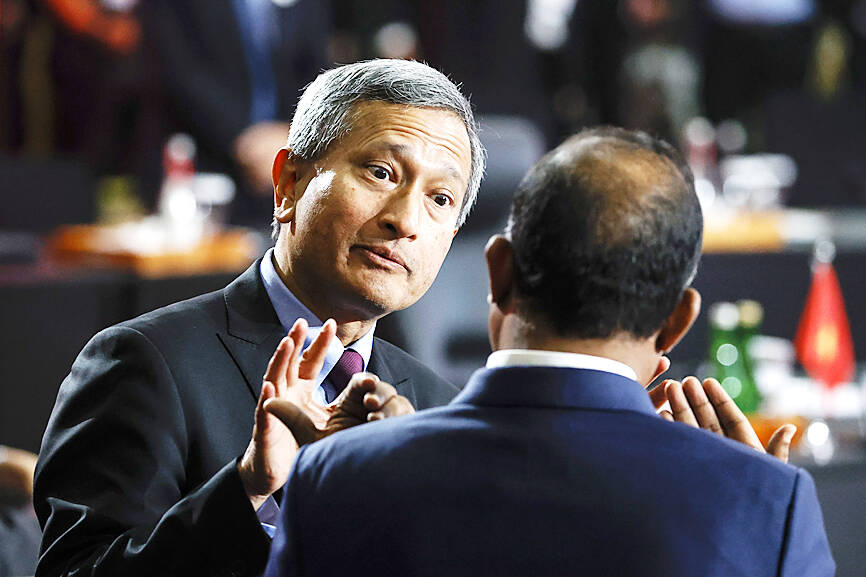Singaporean Minister of Foreign Affairs Vivian Balakrishnan said that growing defense spending, including by China and across Asia, is evidence a peace dividend after World War II that fueled global economic growth is largely over.
“The last seven, eight decades of the peace dividend after the Second World War is over, and you’re going to see increased defense expenditure literally all over the world,” he said yesterday in television interview.
“Certainly in the case of Europe, America still spends more than anyone else, several times more than even China,” he said.

Photo: EPA-EFE
Southeast Asia has grown more vocal over the prospect of a conflict in Asia amid fierce competition between the US and China, as Russia’s war in Ukraine further sours ties between global powers. The region’s concerns lie in the brewing tensions over Taiwan, and China’s military assertiveness in the disputed South China Sea.
China on Sunday said defense spending this year would grow by the fastest pace since 2019, at 7.2 percent, suggesting a ramp-up amid growing rivalry with the US.
Beijing also kept its language regarding Taiwan largely intact in an annual report, implying that Chinese President Xi Jinping (習近平) is maintaining a policy of “peaceful reunification” with the self-governing island.
“I expect to see greater expenditure all around, including within Asia,” Balakrishnan said, adding that the spending boost in China and other countries does not necessarily imply the existence of an arms race.
“My point is to recognize the reasons behind this,” he said. “The rules-based world order, the focus on economic integration, liberal economics, free trade, all that was a formula for peace and prosperity, and now the faith in those pillars has been shaken. It’s a flight to safety in a way.”
While the region has largely refrained from choosing sides between the US and China, that is becoming more difficult for some. Philippine President Ferdinand Marcos Jr reacted to a record number of Chinese incursions in waters it claims by granting the US greater military access.
Meanwhile, Malaysian Prime Minister Anwar Ibrahim has said that welcoming military forces is the wrong approach to deescalating tensions.
Singapore has rebuffed pressure by other countries to choose a side, with Balakrishnan telling parliament last month that “we will not be a proxy or a stalking horse for any superpower.”
The city-state is not a claimant to the South China Sea, but Balakrishnan said in the interview the territorial disputes in the South China “may take generations to resolve.”
“This is an area where China can afford to be and should be more generous to the smaller, weaker states in Southeast Asia,” he said.
In the meantime, Balakrishnan said the US and China should focus on developing economic ties with Southeast Asia.
“I’m not trying to trivialize the the tensions in the South China Sea, but what I’m saying is that if everyone can keep calm, less drama, and focus, follow the money, I think that’ll be helpful,” he said.

THE TRAGEDY OF PUNCH: Footage of the seven-month-old Japanese macaque has gone viral online after he was rejected by his mother and formed a bond with a soft toy A baby monkey in Japan has captured hearts around the world after videos of him being bullied by other monkeys and rejected by his mother went viral last week. Punch, a Japanese macaque, was born in July last year at Ichikawa City Zoo. He has drawn international attention after zookeepers gave him a stuffed orangutan toy after he was abandoned by his mother. Without maternal guidance to help him integrate, Punch has turned to the toy for comfort. He has been filmed multiple times being dragged and chased by older Japanese macaques inside the enclosure. Early clips showed him wandering alone with

South Korea would soon no longer be one of the few countries where Google Maps does not work properly, after its security-conscious government reversed a two-decade stance to approve the export of high-precision map data to overseas servers. The approval was made “on the condition that strict security requirements are met,” the South Korean Ministry of Land, Infrastructure and Transport said. Those conditions include blurring military and other sensitive security-related facilities, as well as restricting longitude and latitude coordinates for South Korean territory on products such as Google Maps and Google Earth, it said. The decision is expected to hurt Naver and Kakao

Australian Prime Minister Anthony Albanese yesterday said he did not take his security for granted, after he was evacuated from his residence for several hours following a bomb threat sent to a Chinese dance group. Albanese was evacuated from his Canberra residence late on Tuesday following the threat, and returned a few hours later after nothing suspicious was found. The bomb scare was among several e-mails threatening Albanese sent to a representative of Shen Yun, a classical Chinese dance troupe banned in China that is due to perform in Australia this month, a spokesperson for the group said in a statement. The e-mail

TENSIONS: The march went ahead without clashes, but arrests were still possible as police investigate suspects behind Nazi salutes, racist slurs and homophobic insults Thousands of people on Saturday marched in southeastern France under heavy security in tribute to a far-right activist whose killing, blamed on the hard left, has put the country on edge. The crowd — many wearing black and some covering their lower faces with masks — marched through the city of Lyon carrying flowers and placards bearing pictures of Quentin Deranque and the words: “justice for Quentin” and “the extreme left kills.” The 23-year-old died from head injuries following clashes between radical left and far-right supporters on the sidelines of a demonstration against a politician from the left-wing France Unbowed